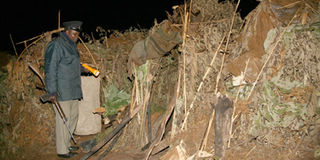Fake Mau settlers line up for payout

A policeman inspects one of the vacant tents during the night at the Kapkembu camp in Kuresoi District where those evicted from Mau Forest are camping. A survey conducted by the Nation found that people posing as evicted have started trooping into the camps. Photo/HEZRON NJOROGE
Tricksters have infiltrated camps for people evicted from Mau Forest putting into jeopardy the government’s compensation plan.
The taxpayer now stands to lose millions of shillings if the imposters are not identified and kicked out, the Nation has learnt.
Scores of residents of the reserve areas near the camps have assumed the status of refugees by day and home owners at night, in a ploy to benefit from a resettlement package that may be given to the displaced persons. The government’s own audit has confirmed that nearly 3,000 homesteads in the camps are those of imposters.
Mau is Kenya’s largest indigenous forest and the biggest water tower with at least 12 rivers originating from it. They include Ewaso Ng’iro, Sondu, Mara and Njoro and encroachment on it has led to the drying up of several lakes in the Rift Valley, which solely feed off its waters.
Mau’s strategic importance lies in the ecosystem services it provides to Kenya and beyond, including the regulation of river flow, flood mitigation, water storage, reduced soil erosion and biodiversity.
Its continued destruction, therefore, threatens to cause a water crisis of national and regional proportions that could extend far beyond the borders of Kenya.
Daily Nation journalists visited camps at Kipkongor and Kurbanyat where more than 1,000 families ordered out of the forest in the first phase of evictions are staying.
The visit established that while the tents are fully occupied with men, women and children during the day, many of them were vacant at night.
Transition camps
Mr Ezekiel Kirui, the vice-chair of the camp, confirmed that many people from the nearby Kapkembu settlement scheme were masquerading as having been evicted and have been trickling to the transitional camps during the day. At night their tents are deserted.
Mr Kirui who moved out of Tilolwet Village in the forest, said: “Some of us in these camps are land speculators and are here expecting to hijack the opportunity and get compensation.”
He said the number of those evicted in a camp called Tarta had shot up since the government announced a Sh35,000 compensation for the victims.
The cheats are also benefiting from humanitarian aid of food, blankets and medicine provided by charitable organisations and the government.
This had drastically reduced the rations for genuine victims of eviction, Mr Kirui said.
“The first registration conducted indicated that we are around 684 families, but the number has since risen to more than 2,000 families with many still streaming in,” he said.
Rift valley PC Osman Warfa has previously warned about the imposters.
The PC said initially there were 5,784 households in the camps, but after the completion of the registration exercise two weeks ago, it was established that only 2,850 were genuine.
Demolished
After the eviction, the villagers came out with the little they could carry, leaving behind homes that have reportedly been demolished, property and a maize crop.
One of those evicted, Mr Joshua Kibet Koech, said they were still hoping the government would reverse the evictions and let them return to the Mau.
He said their main concern was the maturing fields of maize, sorghum and finger millet, which most of them were looking forward to harvesting in a few months time.
Those interviewed claimed they had stayed in the forest for decades and removing them without any form of help was inhuman.
But the government insists that this group of settlers moved into the forest within the last six or seven years.
Conditions in the camps are dire. One cannot ignore the infants sleeping in the cold; mothers with only leftovers to feed their children, and fathers and sons, who now forage bare land in search of a meal to last until donations arrive.
The midnight patrol in Kapkembu camp found the entire camp asleep save for the silence occasionally broken by coughs of some of the evicted and barking dogs.
Accompanied by police officers from the Molo police division, we visited both the unoccupied structures and those with occupants.
Smoulders from the previous night’s fires can be spotted from the road in the various tents, some of which the residents had converted to sleeping units at night.
Visits to the heart of the forest are now restricted with forestry officers in place to enforce the directive.
However, the evicted people may be escorted to check on the livestock they left back in the forest.




